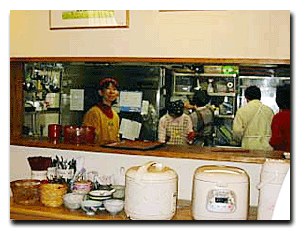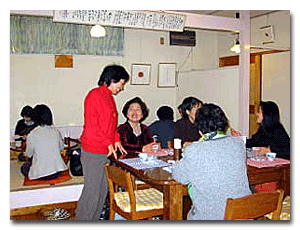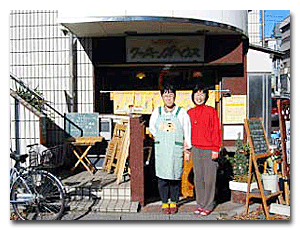"Cooking House," a healthy, safe waystation for Japanese with emotional impairments (June.2003)
In Order to Live Together
Once you step into "Cooking House" in Chofu, a suburban area of Tokyo, you will find yourself in a comfortable room filled with soft sunshine. "Welcome to Cooking House!" vigorous voices greet you. Cooking House is a restaurant that serves healthy food made only from natural ingredients. Fifteen years ago, Sachiko Matsuura, who had been working in the psychiatric department of a hospital as a social worker, established the provision of a space for persons with mental illness to work so that they could live together harmoniously in the town. At that time hospitalizing persons with mental disorders was considered a proper way to handle these kinds of situations. In a great many cases, people could not find a place to go after being discharged from hospital, suffered a recurrence of their illness, and ended up being hospitalized again. According to the Ministry of Health, Labour and Welfare, about 330,000 persons with mental illnesses are currently hospitalized in Japan, and more than 140,000 of them have been in hospital for more than five years (data from "Mental Health and Welfare in Japan, 2000 edition" - compiled under the supervision of Mental Welfare Study Group). About half of these people have been in hospital for a long time, which is a phenomenon within developed countries seen only in Japan. According to Matsuura, more than 70,000 of these people could leave hospital now, if society is ready to receive them.


Starting With a Small Place
Matsuura dreamed a society where people lived together regardless of whether or not they have disabilities, or whether or not they have mental illnesses. Sensing that this could not be realized through a big system, she decided to start with a small place. Thus she opened a small restaurant. Eating is, of course, the fundamental human need, so she wanted to start with basics like cooking and eating together. Persons with mental illnesses started to visit the place willingly, which delighted her very much. Then she opened two more restaurants, where 80 individuals (ranging between the ages of 21 and 68, and all receiving psychiatric treatment) work together at their own pace. Now thanks to word-of-mouth and the mass media, many people come here from both the local neighborhood and afar during lunchtime. They also deliver meals to the elderly who live alone in the neighborhood.


Social Skills Training to Build Confidence
Persons with mental illnesses can get mentally fatigued from maintaining relations with others. When they go out they can become nervous, worrying that they might make a mistake. Therefore the activity that Matsuura focuses on at Cooking House is SST (Social Skills Training). With the help of Prof. Kei Maeda of Japan Lutheran College, role-playing activities enable persons with mental disorders to learn how to build a harmonious relationship with others and how to behave easily - the skills they have often lost during their stay at hospital. For example, a member of Cooking House had visited a hair salon, and had difficulty responding to a staff member's question, "Are you off today?" Through STT individuals can be best equipped to deal with these kinds of situations. Imagining difficulties they may face in real life, they role-play in various scenarios.
In teaching and developing these skills in individuals it is important to highlight good points in their performance and encourage them with lots of praise. The experience of being praised with affirmations like "Everything went well as practiced" can really strengthen an individual's fragile ego. An accumulation of such experiences then leads them to self-confidence.
SST for families of persons with mental disorders is also available. Matsuura thinks that the cooperation of family is vital in preventing recurrence in this area. Parents can become impatient with the slow pace of their child's recovery, blaming themselves as insufficient child rearers, becoming depressed and discouraged. Matsura encourages parents saying, "You did nothing wrong with your child. Anyone can become mentally ill." Parents, who may have been told something to the contrary can thus breathe a sigh of relief, and regain composure and motivation. Through role-playing, parents learn how to deal with situations such as the ones where their child is about to lose his or her temper, becomes violent, or lose self-confidence and become confused. Having better communication with his or her family is crucial for recovery from mental illness. Actually, the likelihood of recurrence is less for those who have received SST, and ten members have gone on to leave the Cooking House and work in society.
Counseling for Citizens
At Cooking House, counseling for citizens is also available. The number of people with various anxiety problems and loneliness is increasing, mainly due to strained relations under the current recession, anxiety about how to raise children, a strict school life for students, and anxiety about the aging society. This counseling service is fully booked two months in advance. Matsuura feels that these people constitute a part of ordinary society and their concerns are shared outside of the psychiatric field.
The Fourth Cooking House
Matsuura has been invited as a lecturer to many places to talk about her experiences at Cooking House. Sometimes members accompany her to tell of their progress in their own words. One member called these lecture meetings at various places with Matsuura "the fourth Cooking House", because of the way it continued in the aiding of recovery. Hoping to convey their experience to more people, members voluntarily started to talk about their lives at Cooking House, which they describe as a place that offers "peace of mind", " a lifeline" and "hope to live". By expressing their emotions in their own words and explaining what they need and how they can recover a sense of spirit, they can broaden people's understanding of persons with mental illness. Cooking House continues to spread its message: "let's live life, starting with a small place". This is the message being sent not only to those who have been suffering from mental illness but those who are working hard and stressed in every walk of life.
